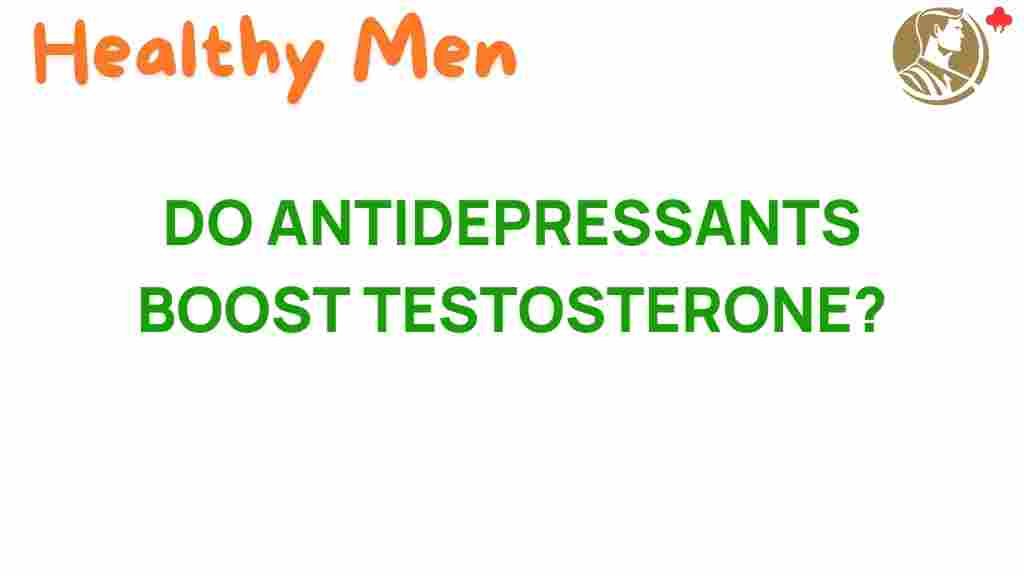Do Antidepressants Really Boost Testosterone Levels?
In recent years, the relationship between antidepressants and testosterone levels has garnered significant interest among researchers, healthcare professionals, and patients alike. This is particularly relevant for men’s health, as testosterone plays a vital role in various aspects of physical and mental well-being. With the growing prevalence of depression and anxiety disorders, understanding how antidepressants might influence testosterone levels can provide valuable insights into hormone therapy and overall mental health management.
Understanding Antidepressants
Antidepressants are medications commonly prescribed to treat depression and other mood disorders. They work by modifying the levels of neurotransmitters in the brain, which are chemicals that facilitate communication between nerve cells. The primary types of antidepressants include:
- Selective Serotonin Reuptake Inhibitors (SSRIs): These are the most commonly prescribed antidepressants and work by increasing serotonin levels in the brain.
- Serotonin-Norepinephrine Reuptake Inhibitors (SNRIs): These affect both serotonin and norepinephrine levels.
- Tricyclic Antidepressants (TCAs): An older class of antidepressants that are less commonly used today due to side effects.
- Monoamine Oxidase Inhibitors (MAOIs): These are effective but require dietary restrictions to avoid serious interactions.
While these medications are essential for mood stabilization and improving mental health, they may also have effects on other hormones, particularly testosterone.
The Role of Testosterone in Men’s Health
Testosterone is a crucial hormone in men’s health, responsible for various functions, including:
- Regulating libido and sexual function
- Maintaining muscle mass and strength
- Supporting bone density
- Influencing mood and cognitive function
Low testosterone levels, or hypogonadism, can lead to a variety of symptoms, including fatigue, depression, decreased libido, and reduced muscle mass. Therefore, understanding how antidepressants interact with testosterone is vital for optimizing treatment for those experiencing both depression and low testosterone.
The Connection Between Antidepressants and Testosterone Levels
Research on the relationship between antidepressants and testosterone levels has produced mixed results. Some studies suggest that certain antidepressants may have a positive influence on testosterone, while others report no significant changes or even a decrease in testosterone levels. Here’s a closer look at the findings:
- Positive Effects: Some studies indicate that antidepressants, particularly SSRIs, may help improve testosterone levels in men suffering from depression. The theory is that by alleviating depressive symptoms, these medications may indirectly boost testosterone production.
- Negative Effects: Conversely, other research has shown that certain antidepressants can lead to reduced testosterone levels. This is particularly noted with long-term use of some SSRIs and SNRIs, which may interfere with hormonal balance.
- No Significant Change: Many studies reveal that the use of antidepressants does not significantly alter testosterone levels, suggesting that the impact may vary based on individual biology, the specific medication used, and the duration of treatment.
Mechanisms Behind the Interaction
The interaction between antidepressants and testosterone levels is complex, influenced by several biological mechanisms:
- Neurotransmitter Influence: Antidepressants alter the levels of neurotransmitters like serotonin and norepinephrine, which can impact the hypothalamic-pituitary-gonadal (HPG) axis, a critical regulator of testosterone production.
- Stress Response: Chronic stress and depression can lead to elevated cortisol levels, which negatively affect testosterone. By reducing stress and improving mood, antidepressants may help restore testosterone production.
- Weight and Lifestyle Changes: Some individuals may experience weight gain or changes in physical activity levels while on antidepressants, which can affect testosterone levels.
Step-by-Step Process: Evaluating Antidepressants and Testosterone Levels
For those concerned about the impact of antidepressants on testosterone levels, it’s essential to take a systematic approach:
- Consult a Healthcare Professional: Speak with your doctor about your mental health and any concerns regarding testosterone levels.
- Get Tested: A simple blood test can measure your testosterone levels and help determine if they are within the normal range.
- Monitor Symptoms: Keep track of symptoms related to mood, energy, and libido. This can provide valuable information for your healthcare provider.
- Review Medication Options: Discuss different antidepressant options with your doctor, considering potential effects on testosterone levels.
- Consider Hormone Therapy: If low testosterone is diagnosed, explore hormone therapy options with your healthcare provider to address both mental health and hormonal balance.
Troubleshooting Tips for Managing Mental Health and Testosterone
For individuals navigating the complexities of mental health, antidepressants, and testosterone levels, here are some troubleshooting tips:
- Maintain a Healthy Lifestyle: Regular exercise, a balanced diet, and adequate sleep can naturally support both mental health and testosterone levels.
- Consider Alternative Treatments: Explore therapy options such as cognitive-behavioral therapy (CBT) or mindfulness practices as adjuncts to medication.
- Stay Informed: Keep researching and discussing the latest findings related to antidepressants and testosterone with your healthcare provider.
- Support Network: Engage with support groups or communities that focus on mental health and men’s health issues.
Conclusion
In summary, the relationship between antidepressants and testosterone levels is intricate and varies greatly among individuals. While some studies suggest a potential boost in testosterone levels with certain antidepressants, others indicate a possible reduction or no significant change at all. It’s crucial for individuals dealing with depression and low testosterone symptoms to consult healthcare professionals for personalized advice and treatment options.
By understanding the psychological effects of antidepressants and their influence on hormones, individuals can make informed decisions about their mental health care and overall well-being. Remember, managing mental health is a multifaceted journey that requires attention to both psychological stability and hormonal balance.
For further reading on mental health and hormone therapy, check out this comprehensive guide on managing depression and its effects on health. Additionally, for a deeper understanding of testosterone and its significance, visit this resource.
This article is in the category Mental and created by healthymen Team
